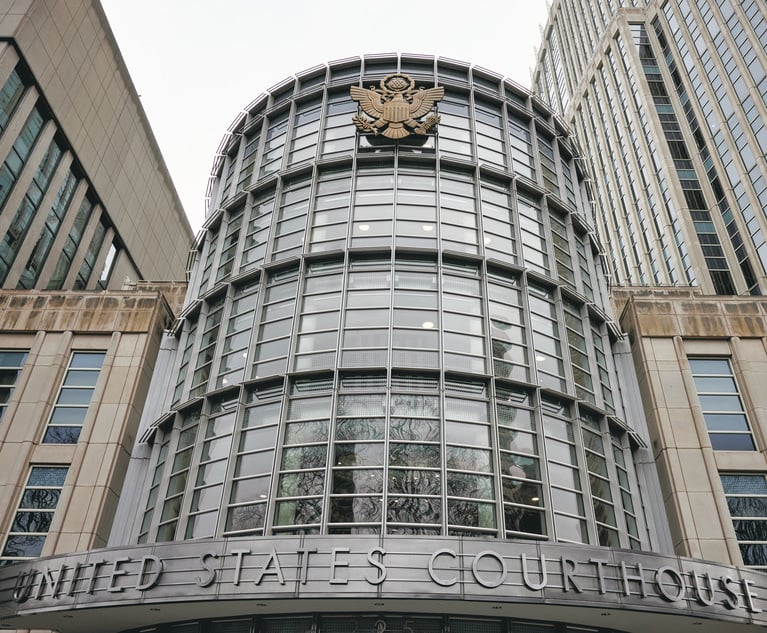Upstate Town Must Consider Brooklyn-based Yeshiva's Plan for School, Dorm
An Appellate Division, Third Department panel rejected the Town of Wawarsing's Zoning Board of Appeals' finding that much of the yeshiva's converted-building use proposal, from classrooms to a dorm, was “akin to a school or a camp.”
April 02, 2019 at 05:56 PM
5 minute read
 Third Department courthouse. Photo: NY Courts
Third Department courthouse. Photo: NY Courts
An Upstate town has wrongly turned away a Brooklyn-based Orthodox Jewish yeshiva's application to convert existing area buildings into classrooms and residences for boys' studies, a state appeals court has ruled, writing that the applicable zoning ordinance's definition of a place of worship “expressly” and “unambiguously” includes the facilities proposed.
An Appellate Division, Third Department panel rejected the Town of Wawarsing Zoning Board of Appeals' finding that much of the yeshiva's converted-building use proposal, from classrooms for Torah and Talmudic study to a dorm, was “akin to a school or a camp” that didn't belong on the yeshiva's 23-acre site.
The board had acknowledged that Yeshiva Talmud Torah Ohr Moshe's proposed synagogues and rabbi residence were permitted, the panel pointed out, but it had asserted that proposed summertime school and living facilities for about 150 male students between ages 12 and 17 were not permitted within the Neighborhood Settlement District on which the site is found.
Looking to the zoning ordinance's language for such districts, the panel wrote in part that “on-site school halls that provide religious instruction incident to the use of a structure for religious observance, such as the proposed synagogues, are expressly included in the definition of place of worship.”
Addressing the student living and dining facilities, the panel said that the definition “unambiguously includes the living facilities … particularly in light of [the yeshiva's] representation that its purpose in constructing the facility is to provide religious instruction at a location with tranquil natural surroundings that facilitate reflection and study—a use that is consistent with a retreat house—and, thus, such facilities are permitted uses.”
Now, the zoning board must consider the yeshiva's site-plan review application, which it hadn't taken up once it found problems with certain proposals for use of the site, a lawyer for the yeshiva and a principal at Sive Paget & Riesel in New York, Steve Barshov, said Tuesday.
The panel of Justices Christine Clark, Robert Mulvey, Sharon Aarons, Phillip Rumsey and Stan Pritzker explained that in 2016, Yeshiva Talmud Torah Ohr Moshe submitted a site-plan review application to Wawarsing regarding a proposal to rehabilitate and convert existing buildings for “ongoing torah and talmudic studies throughout the summer months” by mostly teenage students.
The proposal included two synagogues, classrooms, a residence for supervising rabbi, and student dormitory and dining facilities, the panel said. It then noted the 23-acre site sits in a Neighborhood Settlement District that allows property to be used for, among other things, places of worship.
Later in its March 28 opinion, the justices pointed out that, under the pertinent zoning ordinance, a place of worship is defined as the “[u]se of land, buildings, and structures for religious observance, including a church, synagogue, or temple and related on-site facilities such as monasteries, convents, rectories, retreat houses, and fellowship or school halls.”
After submitting the site-plan review application, a town municipal code officer determined that the planned use was not permitted because of restrictions on a camp or any type of occupancy that permits overnight residence of students, staff or families, the justices said.
Yeshiva Talmud Torah Ohr Moshe—which runs an all-boys school in Brooklyn, according to various education-related websites—in turn asked the town Zoning Board of Appeals to review that decision. The board later affirmed the determination, concluding that the proposed property use was “akin to a school or a camp,” the panel wrote.
Next the yeshiva brought an Article 78 proceeding in Ulster County Supreme Court, seeking to annul the zoning board's decision. According deference to the board's determination, Supreme Court Justice Lisa Fisher affirmed the board's decision.
The Third Department panel overruled Fisher and ended its opinion by stating that the zoning board's “determination is annulled and the matter is remitted for respondents [which includes the board] to consider [the yeshiva's] site plan application.”
“Judicial review of a determination of a zoning board of appeals is generally deferential,” the justices pointed out. But they noted that “however, where, as here, the issue presented is one of pure legal interpretation of the underlying zoning law or ordinance, deference is not required,” quoting Matter of Fruchter v Zoning Bd. of Appeals of the Town of Hurley.
Mary Lou P. Christiana, an attorney in Kingston, represented the Wawarsing's Zoning Board of Appeals. In an email Tuesday, she said, “My client and I are disappointed in the Appellate Division's decision, and we are exploring whether to seek leave to appeal the decision to the Court of Appeals.”
Barshov said by phone on Tuesday that “there was a question in my mind as to why an issue that was so clear took so long and so many forums before it was correctly ruled upon.”
He added that he and the yeshiva are “very pleased” with the Third Department panel's ruling and said that “he would note that there are many jurisdictions in this part of upstate New York that are adopting zoning rules to restrict yeshivas and their activities they [the jurisdictions] should be paying very close attention to this litigation.”
This content has been archived. It is available through our partners, LexisNexis® and Bloomberg Law.
To view this content, please continue to their sites.
Not a Lexis Subscriber?
Subscribe Now
Not a Bloomberg Law Subscriber?
Subscribe Now
NOT FOR REPRINT
© 2025 ALM Global, LLC, All Rights Reserved. Request academic re-use from www.copyright.com. All other uses, submit a request to [email protected]. For more information visit Asset & Logo Licensing.
You Might Like
View All
The Met Hires GC of Elite University as Next Legal Chief

NY Appellate Panel Cites Student's Disciplinary History While Sending Negligence Claim Against School District to Trial

'No Evidence'?: Big Law Firms Defend Academic Publishers in EDNY Antitrust Case
3 minute read
'Substantive Deficiencies': Judge Grants Big Law Motion Dismissing Ivy League Price-Fixing Claims
3 minute readTrending Stories
- 1Thursday Newspaper
- 2Public Notices/Calendars
- 3Judicial Ethics Opinion 24-117
- 4Rejuvenation of a Sharp Employer Non-Compete Tool: Delaware Supreme Court Reinvigorates the Employee Choice Doctrine
- 5Mastering Litigation in New York’s Commercial Division Part V, Leave It to the Experts: Expert Discovery in the New York Commercial Division
Who Got The Work
J. Brugh Lower of Gibbons has entered an appearance for industrial equipment supplier Devco Corporation in a pending trademark infringement lawsuit. The suit, accusing the defendant of selling knock-off Graco products, was filed Dec. 18 in New Jersey District Court by Rivkin Radler on behalf of Graco Inc. and Graco Minnesota. The case, assigned to U.S. District Judge Zahid N. Quraishi, is 3:24-cv-11294, Graco Inc. et al v. Devco Corporation.
Who Got The Work
Rebecca Maller-Stein and Kent A. Yalowitz of Arnold & Porter Kaye Scholer have entered their appearances for Hanaco Venture Capital and its executives, Lior Prosor and David Frankel, in a pending securities lawsuit. The action, filed on Dec. 24 in New York Southern District Court by Zell, Aron & Co. on behalf of Goldeneye Advisors, accuses the defendants of negligently and fraudulently managing the plaintiff's $1 million investment. The case, assigned to U.S. District Judge Vernon S. Broderick, is 1:24-cv-09918, Goldeneye Advisors, LLC v. Hanaco Venture Capital, Ltd. et al.
Who Got The Work
Attorneys from A&O Shearman has stepped in as defense counsel for Toronto-Dominion Bank and other defendants in a pending securities class action. The suit, filed Dec. 11 in New York Southern District Court by Bleichmar Fonti & Auld, accuses the defendants of concealing the bank's 'pervasive' deficiencies in regards to its compliance with the Bank Secrecy Act and the quality of its anti-money laundering controls. The case, assigned to U.S. District Judge Arun Subramanian, is 1:24-cv-09445, Gonzalez v. The Toronto-Dominion Bank et al.
Who Got The Work
Crown Castle International, a Pennsylvania company providing shared communications infrastructure, has turned to Luke D. Wolf of Gordon Rees Scully Mansukhani to fend off a pending breach-of-contract lawsuit. The court action, filed Nov. 25 in Michigan Eastern District Court by Hooper Hathaway PC on behalf of The Town Residences LLC, accuses Crown Castle of failing to transfer approximately $30,000 in utility payments from T-Mobile in breach of a roof-top lease and assignment agreement. The case, assigned to U.S. District Judge Susan K. Declercq, is 2:24-cv-13131, The Town Residences LLC v. T-Mobile US, Inc. et al.
Who Got The Work
Wilfred P. Coronato and Daniel M. Schwartz of McCarter & English have stepped in as defense counsel to Electrolux Home Products Inc. in a pending product liability lawsuit. The court action, filed Nov. 26 in New York Eastern District Court by Poulos Lopiccolo PC and Nagel Rice LLP on behalf of David Stern, alleges that the defendant's refrigerators’ drawers and shelving repeatedly break and fall apart within months after purchase. The case, assigned to U.S. District Judge Joan M. Azrack, is 2:24-cv-08204, Stern v. Electrolux Home Products, Inc.
Featured Firms
Law Offices of Gary Martin Hays & Associates, P.C.
(470) 294-1674
Law Offices of Mark E. Salomone
(857) 444-6468
Smith & Hassler
(713) 739-1250






